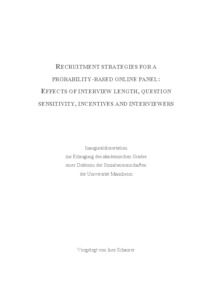|
Recruitment strategies for a probability-based online panel: Effects of interview length, question sensitivity, incentives and interviewers
Schaurer, Ines
![[img]](https://madoc.bib.uni-mannheim.de/42976/1.hassmallThumbnailVersion/Dissertation_Schaurer-1.pdf)  Vorschau |
|
PDF
Dissertation_Schaurer-1.pdf
- Veröffentlichte Version
Download (3MB)
|
|
URL:
|
https://madoc.bib.uni-mannheim.de/42976
|
|
URN:
|
urn:nbn:de:bsz:180-madoc-429762
|
|
Dokumenttyp:
|
Dissertation
|
|
Erscheinungsjahr:
|
2017
|
|
Ort der Veröffentlichung:
|
Mannheim
|
|
Hochschule:
|
Universität Mannheim
|
|
Gutachter:
|
Bosnjak, Michael
|
|
Datum der mündl. Prüfung:
|
29 September 2017
|
|
Sprache der Veröffentlichung:
|
Englisch
|
|
Einrichtung:
|
Außerfakultäre Einrichtungen > Leibniz-Institut für Sozialwissenschaften (GESIS)
|
|
Fachgebiet:
|
300 Sozialwissenschaften, Soziologie, Anthropologie
|
|
Fachklassifikation:
|
THES_SOZ:
Umfrageforschung,
statistische Datenanalyse,
Online-Befragung,
|
|
Normierte Schlagwörter (SWD):
|
Online-Befragung , Umfrageforschung , Experiment , Interviewer
|
|
Freie Schlagwörter (Englisch):
|
Probability-based online panels , panel recruitment , survey experiment , interviewer effects
|
|
Abstract:
|
Probability-based online panels represent a comparably new and emerging form of data collection infrastructures. To date, there is little empirical evidence on online panel recruitment. This dissertation aims to fill the gap and contribute experimental evidence. The overall objective is to identify ways to optimize the telephone recruitment process of a probability-based online panel in Germany and derive practical recommendations. Referring to the Total Survey Error perspective (Groves & Lyberg, 2010) optimal is defined in the sense of maximizing the recruitment probability and online participation probability and minimizing the selection bias under given budget constraints.
Based on the framework of survey participation (Groves & Couper, 1998), the four studies of this dissertation focus on several aspects of the recruitment process that researchers can decide upon and have control about. In three survey experiments, the effect of varying survey features on the success of the recruitment process is analyzed. The experimental factors are the length of the recruitment interview, the inclusion of a sensitive question, and incentives. In an additional analysis, the role of interviewers as an additional error source during the recruitment process is examined.
|
 | Dieser Eintrag ist Teil der Universitätsbibliographie. |
 | Das Dokument wird vom Publikationsserver der Universitätsbibliothek Mannheim bereitgestellt. |
 Suche Autoren in Suche Autoren in
Sie haben einen Fehler gefunden? Teilen Sie uns Ihren Korrekturwunsch bitte hier mit: E-Mail
Actions (login required)
 |
Eintrag anzeigen |
|
|
